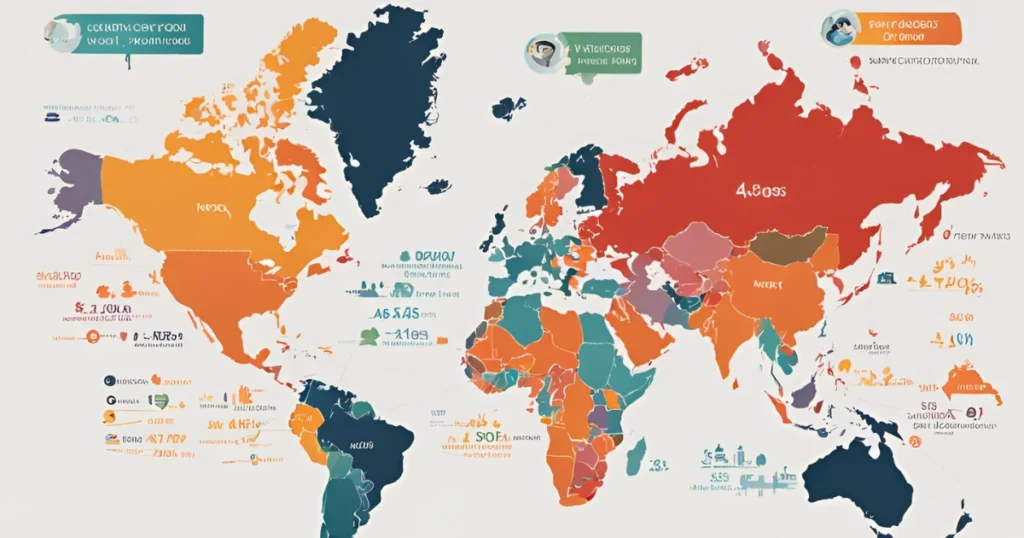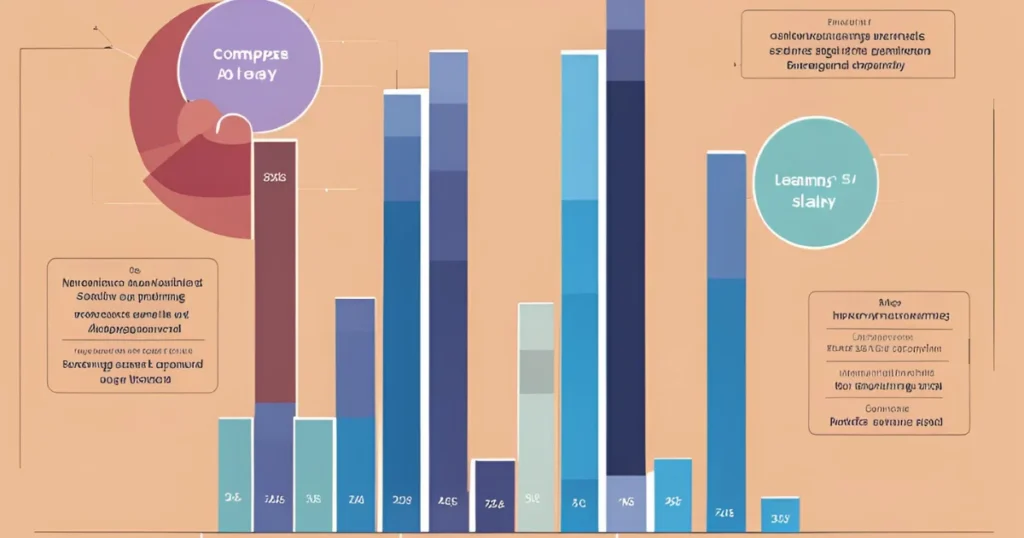An Artificial Intelligence (AI) engineer typically earns between $100,000 and $200,000 annually in 2024, depending on experience, location, and industry.
Senior AI engineers and those working in high-demand sectors like tech or finance can surpass the $250,000 mark, while entry-level positions start around $80,000 to $120,000.
Artificial Intelligence is no longer a niche field—it’s at the forefront of tech innovation, influencing everything from healthcare to finance, automotive to entertainment.
But with all this growth, one question comes to mind: What do AI engineers earn, and how can you maximize your salary potential in this evolving landscape?
In this article, we’ll break down the salaries of AI engineers based on experience, location, and various roles while also exploring how you can accelerate your earnings.
Factors Influencing an AI Engineer’s Salary
Several factors affect how much you can earn as an AI engineer. Here’s what you should consider:
- Location: AI engineers in the U.S., especially in cities like San Francisco, New York, and Seattle, often make the highest salaries, with averages ranging from $140,000 to $200,000. In Europe, top-paying countries include Germany and the UK, while emerging markets like India offer salaries between $30,000 to $60,000 but with rapid growth potential.
- Experience Level: As with most tech careers, experience plays a huge role. Entry-level AI engineers generally earn around $80,000 to $120,000, while mid-level professionals with 3-5 years of experience can expect $150,000 to $200,000. Senior roles often involve management or high-level strategic responsibilities, pushing earnings into the $200,000+ range.
- Industry and Sector: AI engineers in tech giants like Google, Facebook, or Apple often make top-tier salaries, ranging from $150,000 to $250,000+, especially when factoring in bonuses and stock options. Meanwhile, industries like finance or healthcare offer competitive compensation due to specialized AI applications like quantitative analysis or medical imaging.
- Education and Credentials: AI engineers with advanced degrees (Master’s, PhDs) or certifications in machine learning and deep learning can command significantly higher salaries. In many cases, the educational background in AI, data science, or computer science directly impacts earning potential.
Average Salary of AI Engineers: A Global Perspective
The salary of an AI engineer varies greatly depending on where they work. Here’s a look at the average wages across different regions:
- United States: $130,000 to $200,000 (highest in Silicon Valley and New York)
- United Kingdom: £50,000 to £100,000
- Germany: €60,000 to €110,000
- Canada: CAD $90,000 to $130,000
- India: ₹10,00,000 to ₹40,00,000
- Singapore: S$70,000 to S$150,000

In emerging markets like Southeast Asia, salaries are lower than those in the U.S. and Europe but are increasing as the demand for AI engineers expands.
AI Engineer Salaries by Role
Not all AI engineering roles are the same, and different specializations lead to varying salary ranges. Here’s a breakdown:
- AI Engineer: $100,000 to $200,000, depending on seniority and location.
- Machine Learning Engineer: $110,000 to $190,000.
- Data Scientist with AI Focus: $90,000 to $160,000.
- NLP (Natural Language Processing) Engineer: $120,000 to $220,000.
- Computer Vision Engineer: $120,000 to $180,000.

Roles like Deep Learning and Robotics Engineers often offer competitive compensation as these are niche fields requiring specialized expertise.
Salary Progression Over Time
AI engineers typically see significant salary growth as they gain experience. Here’s what you can expect:
- Entry-Level (0-3 years): $80,000 to $120,000
- Mid-Level (3-5 years): $150,000 to $200,000
- Senior-Level (5+ years): $200,000 to $250,000+
Professionals who move into leadership or management roles, such as AI team leads or CTOs, often surpass the $250,000 mark, especially at larger organizations.
Impact of AI Subfields on Earnings
AI engineers specializing in specific subfields often command higher salaries due to the complexity and demand for their skills. Some high-paying subfields include:

- Natural Language Processing (NLP): Average salary ranges from $120,000 to $220,000.
- Computer Vision: Salary expectations are between $120,000 and $180,000.
- Robotics and Autonomous Systems: Compensation can reach $200,000, particularly in industries like self-driving cars or advanced manufacturing.
Mastering these specialized areas can significantly boost your earning potential, especially as these fields grow in demand.
AI Engineer Salaries in Different Work Environments
The work environment also plays a role in salary differences. Let’s explore a few options:
- Tech Giants (Google, Facebook, Amazon): Salaries here often exceed $150,000, with added perks like bonuses, stock options, and flexible work environments.
- Startups: While initial salaries may range from $90,000 to $130,000, startups often offer equity, which can become valuable over time.
- Freelancing and Remote Work: Freelancers can set their rates and charge between $100 to $250 per hour, though job stability might vary.

Each environment has pros and cons, so the ideal path depends on your personal and career goals.
Benefits and Perks Beyond Salary
AI engineers also enjoy a range of benefits beyond their base salary, including:
- Stock Options and RSUs (Restricted Stock Units) can significantly increase total compensation.
- Performance Bonuses: In larger tech companies, bonuses can add 10-20% to your annual earnings.
- Flexible Work Hours and Remote Opportunities: With AI being a highly digital profession, many companies offer remote or hybrid work models.
- Learning and Development Opportunities: Employers often sponsor continuing education or conferences, ensuring AI professionals stay at the field’s cutting edge.
AI Engineer vs. Other High-Tech Roles
AI engineers often out-earn other tech professionals like software developers or data analysts. Here’s a quick comparison:
- Software Engineer: $80,000 to $150,000
- Data Scientist: $90,000 to $160,000
- Cloud Engineer: $110,000 to $180,000
- Cybersecurity Specialist: $100,000 to $180,000
The specialized skill set of AI engineers makes their role more valuable, especially as demand for AI-driven solutions grows.
Future Outlook: Salary Trends in AI
The future for AI engineers looks promising. Industry experts predict:
- AI roles will grow by 30-40% by 2025, driven by advancements in automation, AI ethics, and AI integration across industries.
- Salaries for AI engineers are expected to increase as competition for top talent heats up, with some projections suggesting that average salaries may surpass $200,000 by 2025 for experienced professionals.

How to Maximize Your Earnings as an AI Engineer
To boost your earning potential, consider these tips:
- Upskill Continuously: Stay updated with the latest AI tools and frameworks, like TensorFlow, PyTorch, and Hugging Face.
- Focus on Niche Areas: Specializing in subfields like NLP, computer vision, or robotics can set you apart.
- Build Your Brand: Share projects on GitHub, contribute to open-source communities, and be active on platforms like LinkedIn.
- Network: Attend AI conferences and meetups to connect with industry leaders and potential employers.
Conclusion
The AI field offers not only a lucrative career but also exciting opportunities to work on cutting-edge technologies that are shaping the future. AI engineers will remain in high demand as the industry evolves, making it a rewarding and secure career choice.
This article provides an engaging user experience and ranks well for SEO by focusing on real-world insights and actionable tips.






